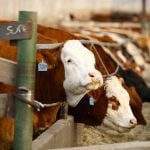A new working paper on export competition, domestic support and market access by World Trade Organization (WTO) agriculture chair Crawford Falconer shows progress on access for Canada’s farmers, the Canadian Federation of Agriculture said Thursday.
The paper, seen as outlining Falconer’s view of the direction for WTO agriculture negotiations, recommends the “complete elimination” of in-quota tariffs over five years — the first such mention of a complete removal, the CFA said in a release.
Canada’s in-quota tariffs are already low and the country has been fulfilling its market access obligations under previous trade deals, the CFA noted. Other countries use in-quota tariffs to “extensively” limit foreign suppliers’ market access.
Read Also

China seeks improved ties with Canada amid rising trade tensions
China called on Friday for steps to improve bilateral ties with Canada, saying there were no deep-seated conflicts of interest, following a spike in trade tensions with many of Beijing’s Western trade partners this year.
Such a move would offer more — and more profitable — market access for ag exporters, particularly in the livestock sector, CFA president Bob Friesen said.
Falconer also proposed provisions on the levels and length of the phase-in period for cuts to domestic supports. The CFA said Canada wouldn’t have to make any immediate cuts, while “major spenders” on domestic supports such as the U.S., European Union and Japan would have to make immediate initial cuts of 30 per cent.
The CFA applauded Falconer for seeking “to recognize who the big spenders are and penalize them accordingly,” said Friesen, who farms at Wawanesa, Man.
“Sensitive products”
However, the federation noted that the paper changed little from the original modalities text in terms of protection for “sensitive products,” which in Canada’s case includes its supply-managed poultry, egg and dairy sectors.
Under the current text, the CFA said, Canada could still only protect four to six per cent of its dutiable tariff lines as “sensitive” and would have to raise its import quotas for any commodities that didn’t implement their full tariff cuts as required. The federation “had hoped to see more flexibility.”
The CFA said it was also concerned that the paper suggests the complete elimination of state trading enterprises, which have previously been viewed as including operations such as the Canadian Wheat Board. CFA said the choice to set up an STE should be that of farmers and governments, not the WTO.
Federal Agriculture Minister Gerry Ritz stressed in a Jan. 4 release that Falconer’s working documents “do not represent consensus among WTO members and will be subject to a lot of further discussion.”
While the government is pleased at the proposed formula for “significant” tariff cuts on non-sensitive products, Ritz said, “we do have significant concerns about key elements of (Falconer’s) document on sensitive products. Canada continues to actively oppose any tariff quota expansion or tariff cuts for sensitive products and we continue to take a firm position on this issue.”
Exports
Other farmers’ groups watching developments at the WTO say Canada’s support for exports is “critical” to the 90-plus per cent of farmers who depend on export sales. Keith Lancastle, executive director of the Canadian Agri-Food Trade Alliance, said in a release that WTO talks are entering a “critical stage” and securing access to key markets is “essential to Canada’s ongoing competitiveness.”
Mike Leslie, CEO of the Alberta Barley Commission, said in the same release Wednesday that the beef and pork sectors, the largest customers for barley, particularly need improved access to be competitive.















